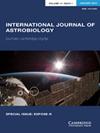天体生物学家是理性的,但不是贝叶斯
IF 1
4区 物理与天体物理
Q3 ASTRONOMY & ASTROPHYSICS
引用次数: 4
摘要
寻找生物特征可能会产生有争议的结果,没有一个生物特征能明确证明生命的存在。贝叶斯统计框架已被建议作为一种工具,用于测试新的观测结果对我们相信另一个星球上存在生命的影响。我们在这里使用金星上磷化氢的初步发现来测试这种方法,作为在一颗其他特征良好的行星上可能检测到生物信号的例子。我们报告了在宣布在金星大气层中检测到磷化氢之前(贝叶斯先验概率)和宣布之后(后验概率),天体生物学家对土卫二、木卫二、火星、泰坦和金星上存在生命可能性的看法的调查。调查结果显示,受访者对任何世界上存在生命的可能性都有一个总体看法,与特定物体的相对排名无关,并且有一个独特的“冰卫星爱好者”亚群体。金星上可能存在磷化氢的宣布使该社区对金星上存在生命的信心略有但显著增强;尽管如此,该团体仍然认为金星是五个目标中最不可能存在生命的地方,仅次于泰坦。我们推导出一个贝叶斯公式,该公式明确包括信号解释的不确定性以及金星上磷化氢是否可能由生命产生的不确定性。我们表明,尽管社区对一个高度出乎意料且仍然是试探性的检测表现出了理性的克制,但他们不断变化的期望并不符合贝叶斯模型。本文章由计算机程序翻译,如有差异,请以英文原文为准。
Astrobiologists are rational but not Bayesian
The search for biosignatures is likely to generate controversial results, with no single biosignature being clear proof of the presence of life. Bayesian statistical frameworks have been suggested as a tool for testing the effect that a new observation has on our belief in the presence of life on another planet. We test this approach here using the tentative discovery of phosphine on Venus as an example of a possible detection of a biosignature on an otherwise well-characterized planet. We report on a survey of astrobiologists' views on the likelihood of life on Enceladus, Europa, Mars, Titan and Venus before the announcement of the detection of phosphine in Venus' atmosphere (the Bayesian Prior Probability) and after the announcement (the Posterior Probability). Survey results show that respondents have a general view on the likelihood of life on any world, independent of the relative ranking of specific bodies, and that there is a distinct ‘fans of icy moons’ sub-community. The announcement of the potential presence of phosphine on Venus resulted in the community showing a small but significant increase in its confidence that there was life on Venus; nevertheless the community still considers Venus to be the least likely abode of life among the five targets considered, last after Titan. We derive a Bayesian formulation that explicitly includes both the uncertainty in the interpretation of the signal as well as uncertainty in whether phosphine on Venus could have been produced by life. We show that although the community has shown rational restraint about a highly unexpected and still tentative detection, their changing expectations do not fit a Bayesian model.
求助全文
通过发布文献求助,成功后即可免费获取论文全文。
去求助
来源期刊

International Journal of Astrobiology
地学天文-地球科学综合
CiteScore
3.70
自引率
11.80%
发文量
45
审稿时长
>12 weeks
期刊介绍:
International Journal of Astrobiology is the peer-reviewed forum for practitioners in this exciting interdisciplinary field. Coverage includes cosmic prebiotic chemistry, planetary evolution, the search for planetary systems and habitable zones, extremophile biology and experimental simulation of extraterrestrial environments, Mars as an abode of life, life detection in our solar system and beyond, the search for extraterrestrial intelligence, the history of the science of astrobiology, as well as societal and educational aspects of astrobiology. Occasionally an issue of the journal is devoted to the keynote plenary research papers from an international meeting. A notable feature of the journal is the global distribution of its authors.
 求助内容:
求助内容: 应助结果提醒方式:
应助结果提醒方式:


